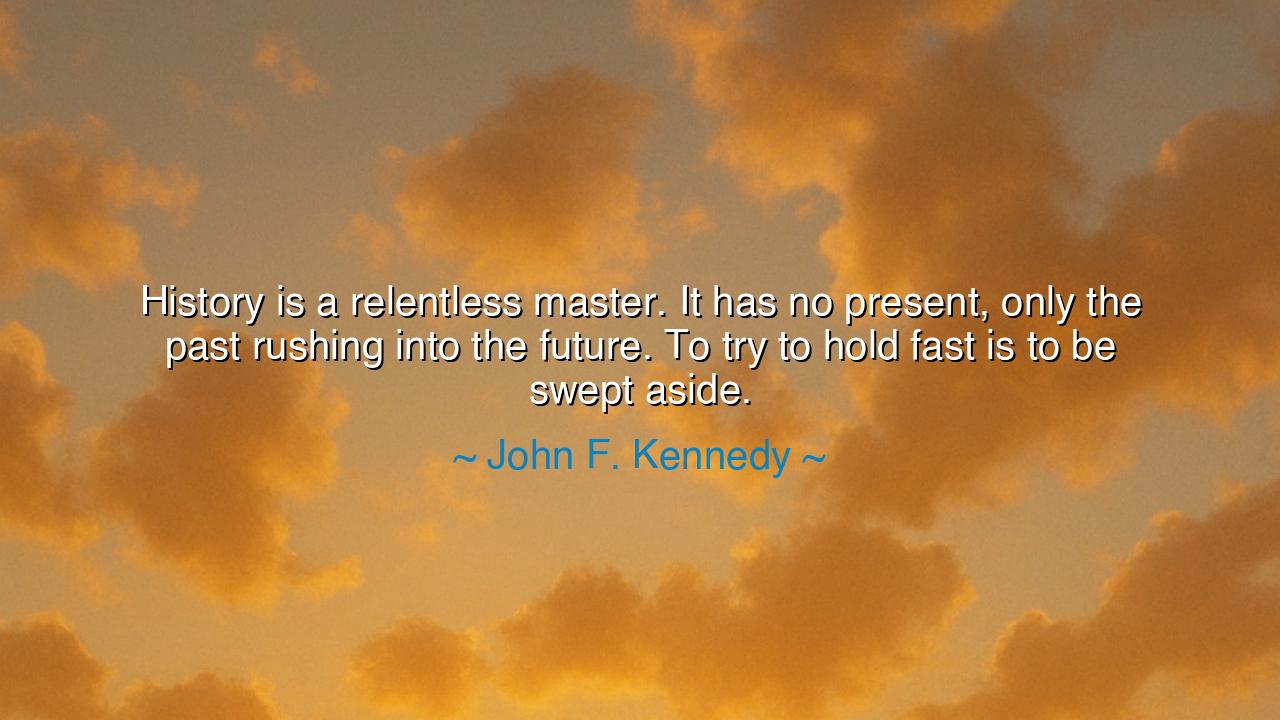
History is a relentless master. It has no present, only the past
History is a relentless master. It has no present, only the past rushing into the future. To try to hold fast is to be swept aside.






"History is a relentless master. It has no present, only the past rushing into the future. To try to hold fast is to be swept aside." These words by John F. Kennedy express the profound and inexorable nature of history—an unstoppable force that moves forward, shaped by the actions and decisions of the past, and ever propelling us into the future. Kennedy speaks of history as something that does not stand still, but rather, surges forward with relentless power, sweeping away those who attempt to resist or hold onto what has already been. This understanding of history calls for humility, for it reminds us that we, as individuals and as societies, cannot halt its course. History, like the river of time, flows relentlessly forward, and those who cling to the past without embracing the future will be left behind.
In the ancient world, the idea that history moves with unstoppable force was deeply understood. The Greeks, with their rich traditions of philosophy and myth, often wrote of the relentless tide of fate, represented by figures like Moira, the Greek Fates, who spun, measured, and cut the thread of life. The poet Hesiod spoke of time as a force that could not be escaped, a relentless progression that even the gods themselves could not alter. The ancient Romans too understood this when they faced the inevitable rise and fall of empires, seeing how even the greatest civilizations were ultimately swept away by the force of time. Whether in victory or defeat, these civilizations were subject to the tides of history, a reminder that the present is always shaped by the past and that the future comes without pause.
Kennedy's reflection on history’s relentless nature also speaks to the human desire for stability. We long for permanence in a world that constantly changes. The present—with its decisions, its ideals, its beliefs—is where we often try to find security, yet it is always fleeting, shaped by the past and always rushing toward the future. This is exemplified in the story of Rome: at its height, it seemed as though the Roman Empire could stand forever, yet, over time, despite its power and might, it could not hold onto its past. The emperors, generals, and politicians who tried to resist change or hold onto outdated traditions were often swept aside by the forces of history, replaced by new powers and ideas. The eventual fall of Rome was not caused by a single event, but by the relentless tide of time, political evolution, and social change that could not be stopped.
The lesson from Kennedy’s quote is profound: history does not wait for us. It moves forward, shaped by the choices we make, the actions we take, and the events that unfold around us. In attempting to hold on to the past, we risk losing the opportunities that lie ahead. Consider Nelson Mandela, whose life was shaped by his ability to look beyond the painful history of apartheid and embrace a future of reconciliation and unity for South Africa. He did not cling to the past injustices; instead, he sought to lead his people into a new era, understanding that the future required forgiveness, courage, and an ability to adapt to the ever-shifting tides of time.
In our own lives, we must acknowledge the force of history as we face the challenges of the present and future. To resist change, to cling to outdated beliefs or systems, is to risk being left behind. As Socrates famously said, "The only constant in life is change." To hold fast to what has already been is to ignore the lessons of the past and the potential of the future. Like Kennedy’s warning, those who try to hold the past too tightly—whether in society, politics, or personal growth—will find themselves swept aside by the force of progress. Change, though often uncomfortable, is the only path forward.
What we must do, then, is learn from the past but not be bound by it. History teaches us the lessons we need to grow and evolve. But to stand still in the present, to resist the winds of change that history brings, is to risk becoming irrelevant. Our actions today, in the present, shape the future, just as the actions of those before us have shaped our reality. Embrace the flow of history, take what wisdom you can from the past, and use it to move forward—to build, to innovate, and to lead with an eye toward what is yet to come.
In this way, we are called not to resist the relentless tide of history, but to understand it, to adapt to its flow, and to be active participants in shaping what is to come. As the ancients knew, and Kennedy reminds us, history is not something we can hold back—but it is something we can navigate with wisdom and courage. Let us embrace the future with all the lessons of the past, for it is only through progress that we can truly move forward, shaping a world worthy of the generations that follow.






AAdministratorAdministrator
Welcome, honored guests. Please leave a comment, we will respond soon